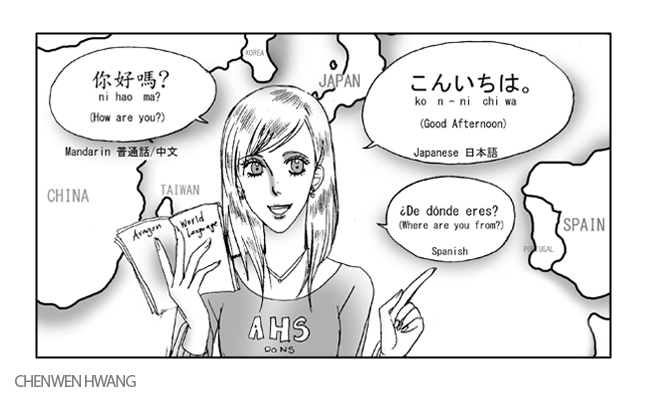
Over the years, the diversity of Aragon’s student body has spewed an outgrowth of different language courses being offered to students. Increased interest in Asian languages has recently led some to think that the Spanish department is beginning to decline.
Since 2008, the number of students enrolling in Spanish has decreased by 60. The number of freshmen enrolled in Spanish has decreased severely, resulting in one less Spanish 1-2 class.
Due to Barbara Viele Basques’ retirement, Spanish teacher Luisa Hardy has taken on extra sections. Hardy believes that despite less students, many people are still interested in learning Spanish. Data has not shown substantial decrease in student enrollment, but Hardy says, “Students are realizing that the world is shrinking and are opening themselves up to new ideas.”
Many students feel more comfortable with Spanish because of previous study and its alphabetical similarities to English.
Additionally, the fact that there is one less Spanish class may be offset by the smaller freshman classes.
On the other hand, Chinese has shown steady growth since its inception in 2007. The department has grown from only two classes and one teacher to six classes. Chinese teacher Sonya Yu is a new face in the World Language department, and was hired to meet the increasing demand.
Interest in Chinese has grown a lot in the past years, leading to gradual change. Although many students believe in the practicality of taking such a language, they consider it to be more difficult than other languages.
Founder and head of the Chinese department Qi Fan says, “The nature of the language is a big challenge because it is not alphabetical.” In the first year of study, students only learn 200 of the 3000 characters that must be mastered for fluency.
Students are often turned away from this and choose to take other languages which they believe are easier.
Casey Cheng, a Chinese-Japanese freshman taking Japanese 5/6, says, “I [have my] mother[’ s] tongue. My mom is Japanese so it is easier for me.” He believes that Chinese was more difficult and chose to take a language that he was more accustomed to.
Despite this, Fan has 26 students enrolled in AP Chinese, all with various motivations for taking the class. Speculation has been raised that fluent speakers taking Chinese are enrolling purely for the grade benefits. Zhili Wang, a senior who moved here three years ago from China, takes it mostly for the grade, while senior Michele Mao says that many others are motivated by other reasons. She learns for culture and says, “It’s easy [for me] and I have a 99 percent, but it is harder for the non-native speakers.”
Junior Eric Ho relates that AP Chinese is hard despite him being fluent, but he is willing to take on the difficulties of the language and strives to take the class for more than just a grade. “It is hard [but] I want to practice more and learn simplified Chinese,” says Ho.
From a statistical standpoint, the World Language department is changing, but change is slow. Chinese interest is gradually increasing and it is becoming apparent that many are beginning to think about their futures, but the language still presents much difficulty because of its complexity. It seems that the Aragon World Languages department is successful at accommodating rising interest for new languages while maintaining interest for the traditional.




